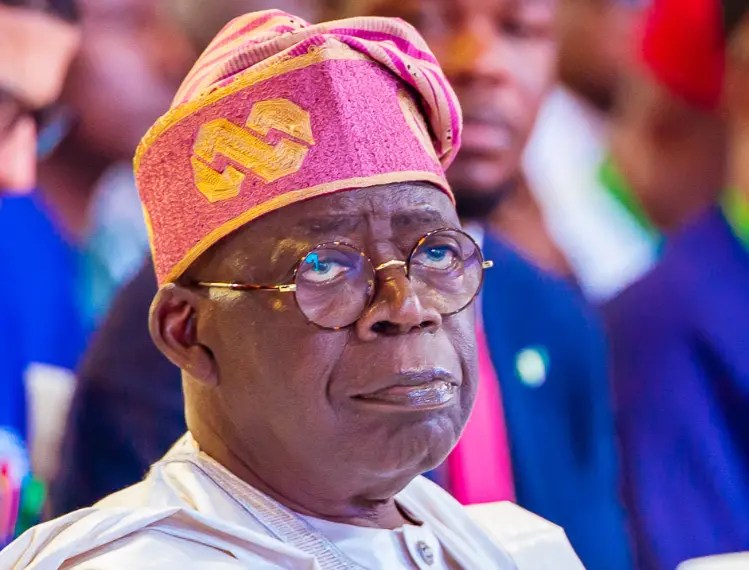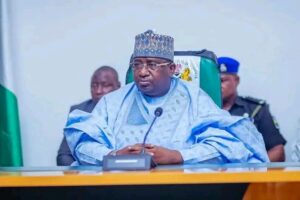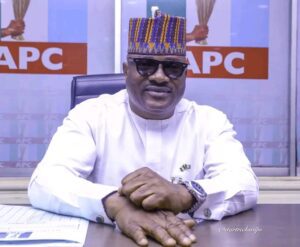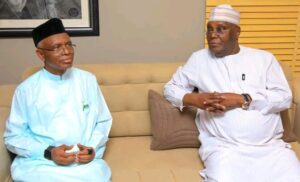Nigerians Are Losing Hope, Getting Angry, NNPP Chair Tells Tinubu

Former National Chairman of the New Nigeria Peoples Party (NNPP), Prof. Rufa’i Alkali has asked President Bola Ahmed Tinubu to buckle up as Nigerians are losing hope and getting angry.
Alkali, who stated this in a paper titled: “Rethinking the Neo-Liberal Economic Doctrine: Time for a new deal for Nigerians warned that the World Bank and International Monetary Fund (IMF) pills were capable of tumbling the present government.
Alkali, who is a visiting Professor,
National Universities Commission and former Political Adviser to former President Goodluck Jonathan posited that the World Bank and IMF policies have never improved the economic situations of African countries.
He argued in the paper presented at the first Bauchi College of Arts and Science (BACAS) Old Students Reunion Convention held at Abubakar Tafawa Balewa University, Bauchi on Saturday that Neo-Liberal Economic ideologies are injurious to the Nigerian economy and well-being of the people.
READ ALSO:: Nigeria Survival Depends Largely On Human Capital Devt – Tinubu
He said, “Today, everywhere you go around the country, the cry of food, food and food rants the air with many more people going to bed (if they have any bed at all) and waking up in the morning with empty stomachs, with no hope of getting food anytime soon.
“In communities devastated by insecurity and in families with many small children whose parents have been killed, the situation is even more dire and distressing. It is obvious, that a hungry man is an angry man. One consequence of all these is the loss of hope in the land. It is an incontrovertible fact that many Nigerians have lost hope in the country, many others have lost hope in democracy and even many more Nigerians have lost hope in themselves.
“Although it might require further in-depth research to corroborate, it is a fact that the frequency of suicides in Nigeria in the last few years appears to be on the increase.
Unfortunately, a lot of drama has been added to the gory incidences of suicide in Nigeria, with many of those planning to commit suicide doing so openly in public spaces in order to attract the media to achieve maximum effect. As in all instances, while it is very difficult to pin down specific causes or causes of these suicides, nonetheless, it is not too difficult to deduce that the harsh economic conditions in the country, accompanied by social pressures are major contributors.
“Late last year, in November 2023, a video clip trended online showing a young Nigerian man from Edo State called Alvin Ilenre, a graduate of Ajayi Crowther University, Oyo, Oyo State, publicly setting fire to his primary school, diploma, Bachelors Degree and NYSC certificates saying that since his graduation for nearly thirteen years, the certificates did not serve him any purpose.
While many social media followers were shocked and surprised that anyone could go this far, the lesson from this was that there was no easier and harsher way of dismissing the education system in the country.
It is a fact of life today that the biting economic conditions have deepened hunger, poverty, unemployment and general bitterness and resentment in the country. This has also raised anger and bitterness in the land. After pursuing the neo-liberal doctrine for over forty years, Nigeria has been caught up in the web.
“Nigerians are also getting angry because Nigerian’s image and respectability are being systematically eroded. When a bullish American President calls African countries shit holes, we take it calmly and do not respond; when a British Prime Minister calls Nigeria, fantastically corrupt, we shrug it off, as if he didn’t say anything; when Nigerians are chased away from African countries, we bark but we not bite; and when descent and innocent Nigerian citizens are maltreated at foreign airports, we just look the other way, we do not carry out reprisals to forestall future similar diplomatic embarrassments to our citizens. In short, Nigeria and Nigeria’s image and respectability are being eroded and undermined on a daily basis and certainly, Nigeria does not deserve this.
“Popular Consensus Among Nigerians
despite all the deafening noise, grandstanding and brinkmanship which is common in Nigerian politics, especially during the election season that we have just passed through, there is popular consensus among Nigerians in a number of areas relating to our great nation: In the first place, virtually every Nigerian, including friends of Nigeria are agreed that our country is not moving fast enough and nor is it moving in the right direction of fulfilling its manifest destiny as the leading and leader on the African continent.
Some Nigerians even believe, rightly or wrongly, that we as a nation are either stuck in one place or even moving backwards compared to some of the leading nations in the world;
“Secondly, most Nigerians believe, here rightly too, that the country has vast human and natural resources, that if these resources were properly harnessed, these would propel us to accelerated economic development, social advancement and political stability and so far this has not happened.
“Thirdly, most Nigerians believe, that unless something is done urgently, Nigeria’s economic and socio-political drift will be exacerbated with far-reaching consequences not only for Nigeria as a country but for the African Continent as a whole. Already the deepening economic crisis in the country has impacted virtually every sector of the national economy, especially in the areas of agriculture, the manufacturing sector and commerce. As we noted earlier, these have been exacerbated by general insecurity in the country.
“Popular Explanations About The Causes Of Crisis In Nigeria: Unfortunately, while there is a general agreement about the existence of these problems, there is no agreement on the causes of these problems and their solution.
There are a number of critical issues that are often raised and advanced forward as explanations for the causes of Nigerian economic crises. Instead of situating the ongoing crisis at the doorstep of the neo-liberal ideologues, most Nigerians often prefer to look elsewhere for the causes of the Nigerian economic crisis.
“The most popular among these explanations include among others: issues of lack of elite consensus; unbridled corruption both in low and high places; the dysfunctional State; manipulations from foreign powers; the indiscipline of Nigerians; and the problem of fiscal Federalism. Each of these has attracted interest among Scholars, Political analysts and Civil Society organisations.”
On the effects of World Bank and IMF ideologies in the country, he said, “But the long-term objective of the IMF was always the removal of all subsidies especially agricultural and fuel subsidies and allowing floating exchange rate for the national currencies – in the case of Nigeria, the total devaluation of the Naira. Today, virtually all these have been achieved by the Bretton Wood institutions.
More recently in a final push, in February 2024 the IMF began to call for the removal of subsidies from electricity and already some senior Government officials have started echoing this IMF demand.
“So, while most of these neo-liberal policies were in principle intended to reduce or remove Government intervention or involvement in businesses ostensibly on the pretext that market forces are more efficient in the allocation of resources, there is nowhere in the world where Governments abdicate their responsibilities to their citizens without adverse consequences. What we are facing today therefore are existential issues concerning the social, economic and political consequences of swallowing the World Bank and IMF pills. Undoubtedly, these policies have brought about serious economic, security and social consequences.
In the first place, the Nigerian Economy has been going into a deeper and deeper crisis. This fact is known to everyone both within and outside Nigeria and does not require a long explanation. Nonetheless, it is important to mention even in brief the background to some of these problems. It is well known fact that until Nigeria discovered petroleum oil, agriculture was the mainstay of the Nigerian economy characterized by huge production of food and export crops.
“Nigeria was a leading producer and exporter of groundnuts, cocoa, Palm kennels, hides and skins. The discovery of petroleum oil changed all these. Nigeria’s oil export earnings grew steadily and over the years agriculture began to decline.
Even though the contribution of agriculture to GDP in Nigeria remains high, exports of traditional agricultural products began to decline, giving way to petroleum exports.
“I posit that the cumulative effects of over four decades of the involvement and intervention of the Bretton Wood Institutions in the Nigerian economy and society based on the neo-liberal ideology which is insensitive to the feelings and yearnings of Nigerians is the fundamental reason why Nigeria is caught in the web.
“I argue that unless and until Nigeria takes decisive action, we shall be moving in circles. In other words, it is time to Rethink The Neo-Liberal Economic Doctrine. This is precisely, why I call on President Bola Ahmed Tinubu to take far-reaching decisions to give Nigeria and Nigerians a new deal.”






